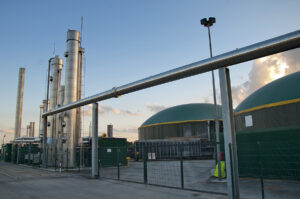ADBA: UK biogas energy production will outpace nuclear by 2031

Huhne pointed to the International Energy Agency’s (IEA) World Energy Outlook, in which the global growth trajectory for the sector is between 8% a year, and 22% a year.
“Even if we grow in the UK at the lowest projected growth rate of the IEA for the world as a whole, that would mean an extra 500 AD plants in the UK by 2030, and if we grow at the higher rate, we'd be looking at an extra 2,000,” said Huhne.
The UK currently has about 723 plants, he added, so this is a substantive projected increase.
Huhne went on to say that, even on the lowest IEA predictions, the industry would produce more energy from biogas in 2031 than the nuclear sector.
“That means we are a big player. [We have] lots of small plants, but I am not making any apologies for that, because you can build small plants a lot more quickly than you can build a nuclear plant.
“Hinkley Point has taken 20 years and it's still not yet plugging electricity into the grid. We can build plants in two-to-three years, [and can] speed that up with the policy support we will be talking about today.”
Huhne added that an aggregation of lots of small biogas plants offers a big solution: “It is my view that it's an enormous advantage for the sector, that we have lots of small plants relative to other sectors of energy production like nuclear, because that makes us more resilient, and in a world where we have an increasing amount of extreme weather events, resilience is going to matter.
“So if there's a big problem with Hinkley point, we have a big problem with the electricity grid. But if we have a problem with one or two biogas plants, all the others are still working. So there’s a natural resilience in the fact that we are a sector composed of a large amount of relatively small plants compared with other energy sectors.”
Biogas can meet 11% of the UK’s future needs, and can meet 10% of current gas imports – it is homegrown, boosts the economy and provides ‘quick wins’ against methane, according to Huhne.
It is also a turn-on, turn-off renewable, unlike nuclear facilities, where the capital costs mean it makes more sense for a site to be always online.
“We’re the fastest growing energy source globally except for solar across the globe, according to the IEA,” said Huhne. “bp, Shell, TotalEnergies – they’re all putting their money into this sector, so this is a big solution.”
However, he went on to say that, compared with the European Union and the US, the UK is lagging behind. For Huhne, the sector needs to ensure that policymakers understand its potential.
“We need to think about all the changes we need to make to bring that vision of the sector into reality, because we can become, and need to become, a big mainstream sector.”
“We have a fantastic story to tell. We need to go out there and tell it again and again and again until policymakers really understand in the UK,” said Huhne.


















